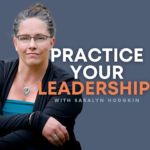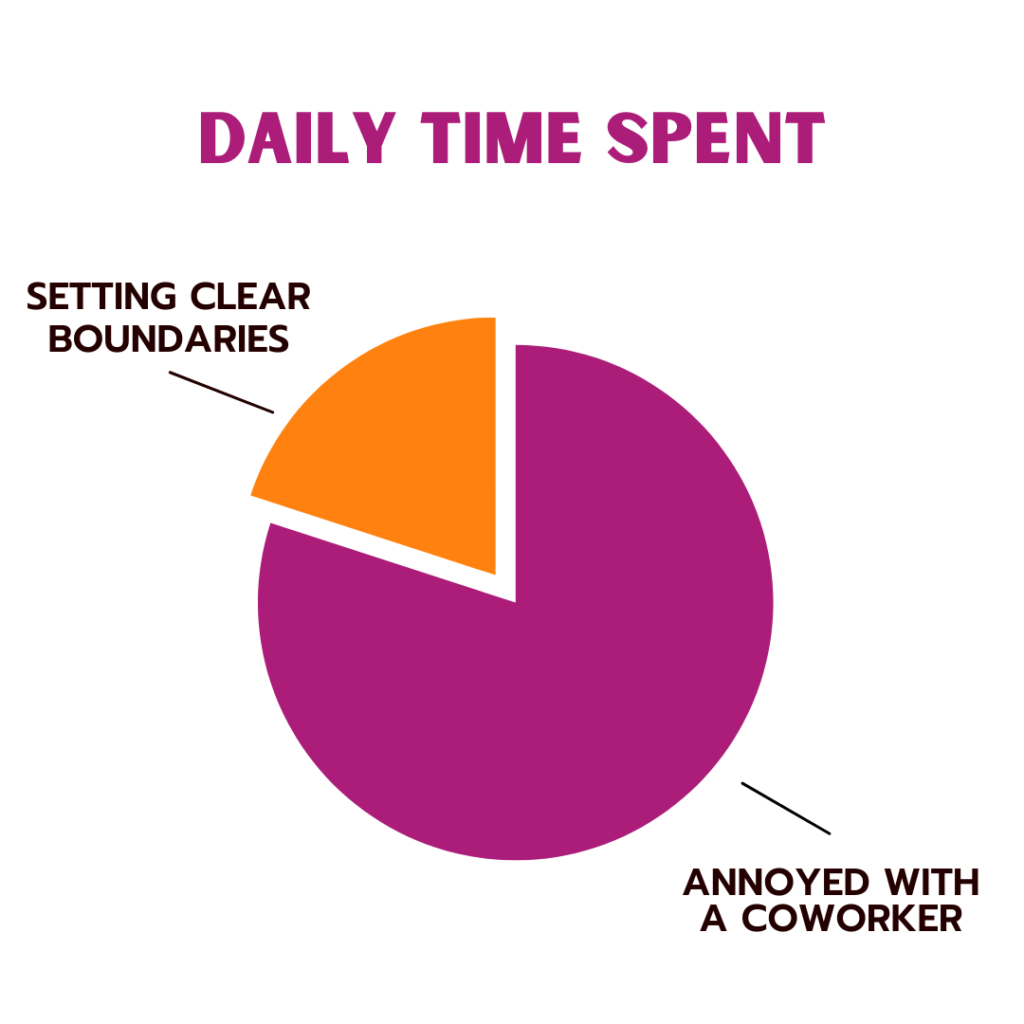Hi everyone. I’m Saralyn Hodgkin, and this is the podcast to practice your leadership.
How do you work with assholes? I mean, there’s so much conversation around how to work in teams, how to work with your colleagues, you know, go on TikToks, whatever socials you use. Right. And what comes down to a lot of it is like, how do I work with people who just drive me up the wall? Like maybe they’re an asshole.
Maybe I just perceive them as an asshole. I don’t know, but they drive me crazy. Or like, right. How do I, how do I do that? And where’s the, where do I find my peace and how do I get this work done and right? All these questions start to come up, and I don’t know about you, but I’ve been in situations where it’s just, it’s drained my energy to such an extent to work with certain individuals.
And sometimes I’m like, God, you’re just so narcissistic or egotistical or like you’re just so focused on things that I am not, that I don’t value. Right. Where you’ve come in here like a, like a, like a dog just running around crashing all the mirrors or, right. It’s, I start to recognize that a lot of it is my experience that I, that I that I honor and that I recognize, but then I go, okay.
I see that I’m being triggered and it’s not up to me to judge whether this person is a good person, a bad person, whatever. It’s my job to recognize that I’m triggered first and foremost, like full stop. I am triggered. What’s going on for me? What are the emotions that come up when I take a breath?
And I step back off the dance floor and I go up into the balcony and I start to try to observe what’s going on here. How can I be curious? Non-judgmental? How can I be generous to myself and to others as I look at what’s going on? And then start to do some of my own work on saying, what’s going on for me?
They’re still gonna be an ass. I’m still gonna get triggered, but I’m not fixing that right now. It’s not about fixing that right now. Right now, and this could take three seconds, this could take 30 days. Right. Whatever it is. But I find that if I come off that dance floor, you know, I’ve gotta find states of resiliency.
‘Cause sometimes I’ll do this when I’m swimming lengths, right? Sometimes I’ll do this in the shower. Sometimes I’ll, I’ll do this sitting at my desk just saying, I need to take a moment. Sometimes I’ll do this on a dog walk. Whatever your process or method is, it’s about coming off that dance floor, taking a breath, and just going, okay.
What’s going on here and not in a judgy way of other people. Just what’s going on here for me? Where’s my mental health at? What patterns am I seeing? Is it with this individual? Is it with this type of individual? Is it in this type of context? Is it when I haven’t eaten and I’m hangry? Like right. But if it’s, if it’s this continual.
Oh my goodness. I’ve done my work and I’ve done my reflecting. Then, then the question comes into, okay, so what am I actually yearning for? What am I actually getting curious about what I need? And even more so what are the elements that I can control, not control, but even more so where am I able to put boundaries and I statements.
And give constructive feedback about what’s useful or helpful for me and what’s not. Like it’s really helpful for me to receive that report, three o’clock on Mondays. Let me tell you my context as to why. ‘Cause you keep giving them to me on Wednesdays at 10 and it’s fucking pissing me off, right? For example, excuse, excuse the language.
Um, or don’t. But it’s like, okay, what? What am I noticing in myself and my context and my emotional state about where I am? Is this nothing to do with this person or is this like, like I notice in my dog there are dogs she does not like. And I don’t know why we’ve kind of actually trended on poodles, but that’s a whole nother thing.
But, um. And a lot of white poodles. Anyways, that’s beside the point. Um, but it’s like, okay, I don’t understand why my dog likes some dogs and doesn’t like other dogs. She just doesn’t. And it trends, and it also trends that if she hasn’t had a good run and a run after a squeaker ball, squeaker ball is important in this case, then she’s just a bitch.
Literally to any dog, whether she likes it or not. Okay. So the context is I need to give her her meds before we go out. She needs to have eaten, she needs to have run ball thrown and stuff, and then it needs to be the right dog or not the wrong dog. Okay. I’ve been able to develop that, uh, you know, like those of us with dogs, I’m sure with other pets as well.
Like you start to get to know them and be able to, can you bring that observer status onto yourself and be able to see, okay. Where are the patterns for what’s going on and what can I learn from those patterns? And can I also acknowledge that there are some people that I’m just not digging with?
Like it just isn’t. And so what do I need to do in order to just hold a respectful, collegial relationship? Right? And sometimes it’s a lot further than that where it’s like, okay, I’ve done my boundaries. I’ve given some appropriately contextualized critical feedback and received some as well. I’ve opened into dialogue maybe in that way, or I’ve done it in, in different ways that are respectful.
All right? Sure. Or I’ve noticed that this dog, this dog is just not a dog I’m hanging with. All right. But then there’s that next level where it’s like, wow, this is toxic. This is all sorts of like not right in this team, in this department, in this organization, in this relationship I have. Like we’ve gone beyond boundaries and we are now in toxicity.
Then, it’s like, okay, can you catch when it’s toxic? Number one, is it coachable? Amenable? Can I work with this in some way? Number two. And then even a step from that, it’s like, okay, can I be conscious of how long this toxicity is going on, my contribution to it and how it’s changing me? How it’s affecting who I am, my integrity, my reliability, to be able to show up the way that I want.
How is this toxicity like how is it affecting the water system, right? And how am I taking some ownership of how I’m starting to contribute to that toxicity? There’s a fine line between, oh, I have a hard time working with that person. A. B. Oh my goodness. There’s always so much drama. And how do I come into a more empowering space with boundaries and being coach-like or being a challenger and so on, and then C. When is this like toxic?
And sometimes it’s hard ’cause we’re taught, like there are subliminal messages and conscious and direct messages I find that have been around me anyways in my growing up of persevere. Be better, be more, fix it, figure it out. And sometimes that’s not the case. I’ve had to learn into that actually this is toxic and I’m starting to see my mental health starting to break down.
And while I have tried to not avoid conflict, but to engage in generative and healthful conflict, I have tried to do my own inner work development on boundaries, whatever it might be. There is a point where the drama is so wearing that it can lead to burnout, or that the drama is so pervasive, it leads to toxicity.
Or that toxicity comes from other things, right? Right. Like seeing gas lighting all the time, or microaggressions or out-and-out racism or whatever it might be. Right just like taking credit for your work. And when it comes down to it, the only thing you can do is control your decisions.
And when you see yourself floating in that pool of toxicity, what’s your decision gonna be about what you’re gonna do now? How long are you gonna let it carry on for? Because you don’t have to fix it. It does not define your worthiness about whether or not you’ve fixed everything. You’ve stayed so long, they need you.
Without you, the organization is crumbling. Right. Okay. Let’s just stop there. What do you value? What are you connecting to in terms of what is important for how you show up and what you cultivate in your own integrity and essence? Resilience. And when you look around, what does that mean for when it comes outta your mouth?
God, these people are such assholes, right? When you step back from a statement like that, can you step back and go, okay, hold on. Let’s come off the dance floor, do some observing and see where are we? Because if you pattern in that toxicity, how long are you staying in that and how is that changing your very nature?
How’s that affecting your family, your friends, your career potential, your goals. Come back to what’s important to you, what you are trying to achieve. And how does letting go of things help here? I thought that after 13 years I would really scale this organization and I’d be in this position and, oh wait, this has turned into something toxic and I’ve gotta feel the futility that this is not the place that I thought would carry me to retirement or would carry me into that role I wanted.
I think I gotta let go. And go into my grieving process of letting go. And then strategically figuring out your exit so you don’t get hoo-ha’d through it. Right? And you get paid your worth and figure yourself out as much as you can, but that you keep your mental resilience, right? Whatever that might mean.
And hopefully you have the, the privilege and opportunities and the space to be able to play with this stuff for yourself. So that’s my 2 cents of when you’re, when you’re in the muck and you’re feeling drama or frustration in who you’re working with, what, what’s your process for stepping back and reflecting and consciously thinking through what’s going on here and now?
Now what am I gonna do with it? How am I gonna behave? What decision do I need to make now? Thanks all. I’m Saralyn. You can find me at holonleadership.org. I walk alongside you as you practice your leadership.



 Apple Podcasts
Apple Podcasts Spotify
Spotify Google Podcasts
Google Podcasts